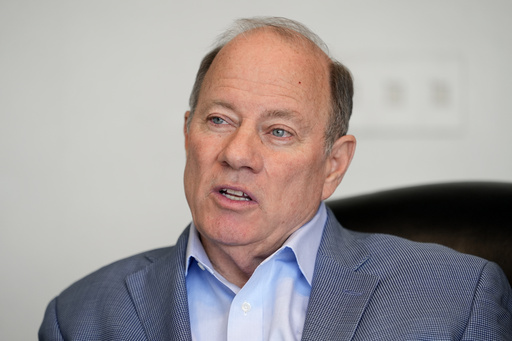DETROIT — Mayor Mike Duggan of Detroit, who has long been affiliated with the Democratic Party, has announced his intention to run for governor of Michigan as an independent in the 2026 election. In a recent interview, Duggan expressed his belief that many individuals are growing weary of both major parties and the political system as a whole. “I want to offer people a choice,” he stated.
At 66 years old, Duggan is widely recognized for his leadership role in guiding Detroit as it transitioned out of bankruptcy, helping it flourish into a more dynamic city. His announcement was made public with a video released on Wednesday morning, although he had already begun discussions about his future ambitions prior to that. Duggan aims to succeed current Democratic Governor Gretchen Whitmer, who is unable to seek re-election due to term limits imposed by Michigan law.
Duggan’s decision to run as an independent comes at a critical time for the Michigan Democratic Party, which is amid an introspective period following disappointing election results in recent cycles. Notably, the state played a pivotal role in former President Donald Trump’s victory in the 2016 election. Just two years earlier, Democrats had celebrated their newfound majority in the state legislature, but recent setbacks have left party members seeking answers and strategies moving forward. It is particularly surprising to see the mayor of a city that has historically supported Democrats choosing to break away from the party altogether.
In his view, Duggan believes that his effectiveness as a governor would be enhanced by this independent status. “The state legislature is nearly evenly split, which heightens the stakes of every issue,” he noted, adding that the increasingly partisan environment has complicated governance.
The mayor may also be aiming to circumvent a potential Democratic primary that could be crowded with prominent contenders, such as Secretary of State Jocelyn Benson and Lt. Gov. Garlin Gilchrist III. There is speculation surrounding U.S. Transportation Secretary Pete Buttigieg, who moved to Michigan in 2022, regarding a possible bid for the Democratic nomination. On the Republican side, notable figures like Sen. Aric Nesbitt and former Attorney General Mike Cox are rumored to be interested in running.
Lavora Barnes, chair of the Michigan Democratic Party, asserted that the potential primary lineup for the governorship is strong and emphasized the party’s commitment to retaining control of the office. Meanwhile, political commentator Adolph Mongo remarked that Duggan’s move alters the campaign dynamics significantly. He believes this shift could attract moderate Republicans who are disenchanted with the extreme positions often associated with their party.
Some Democratic leaders, including Mark Bernstein, a regent at the University of Michigan, argue that running as an independent allows Duggan the freedom to focus on effective leadership without being hindered by party politics. Bernstein noted that many voters are frustrated with the current political landscape, feeling disconnected from both major parties. He emphasized that voters prioritize results, something he believes Duggan can deliver.
Former Lieutenant Governor Brian Calley acknowledged Duggan’s potential as a viable independent candidate but cautioned that the lack of a party backing could pose significant challenges. “Being a target for both sides will be intense,” Calley noted, hinting at the competitive nature of the upcoming election cycle.
Duggan’s independent candidacy may resonate with voters who are seeking alternatives to the traditional two-party system. Historical examples exist, such as Arizona’s Kyrsten Sinema and West Virginia’s Joe Manchin, both of whom transitioned to independents in recent years. However, Michigan has never had an independent governor, and third-party candidates often struggle in statewide elections, as demonstrated by the less than one percent of the vote received by the Libertarian candidate in the last gubernatorial election.
To qualify for the ballot, Duggan needs to gather between 12,000 and 60,000 signatures from registered Michigan voters, ensuring representation from various regions across the state. He expressed, “If you believe the two-party system serves you well, vote Republican or Democratic. But if you want real change in Michigan, I’m offering an independent alternative.”
As Duggan approaches the end of his term as mayor in January 2026, he plans to engage with communities throughout the state that have felt overlooked, emphasizing the importance of listening to their concerns. Having previously held significant leadership roles, including his time with the Detroit Medical Center and as Wayne County prosecutor, Duggan has an extensive background in governance.
Since taking office in 2014, Duggan has seen Detroit recover from a financial crisis marked by staggering debt and high crime rates. Under his leadership, the city has balanced its budget, reduced violent crime, and even experienced a slight population increase—its first since the 1950s. As he prepares for this new political chapter, Duggan aims to continue improving the quality of life for Michigan residents.




